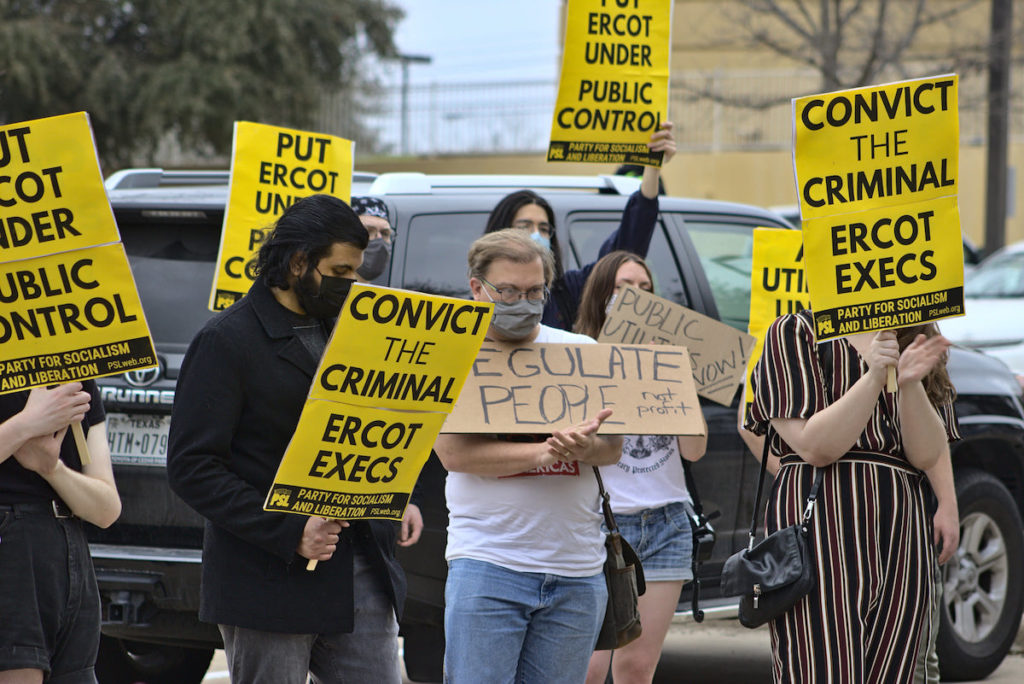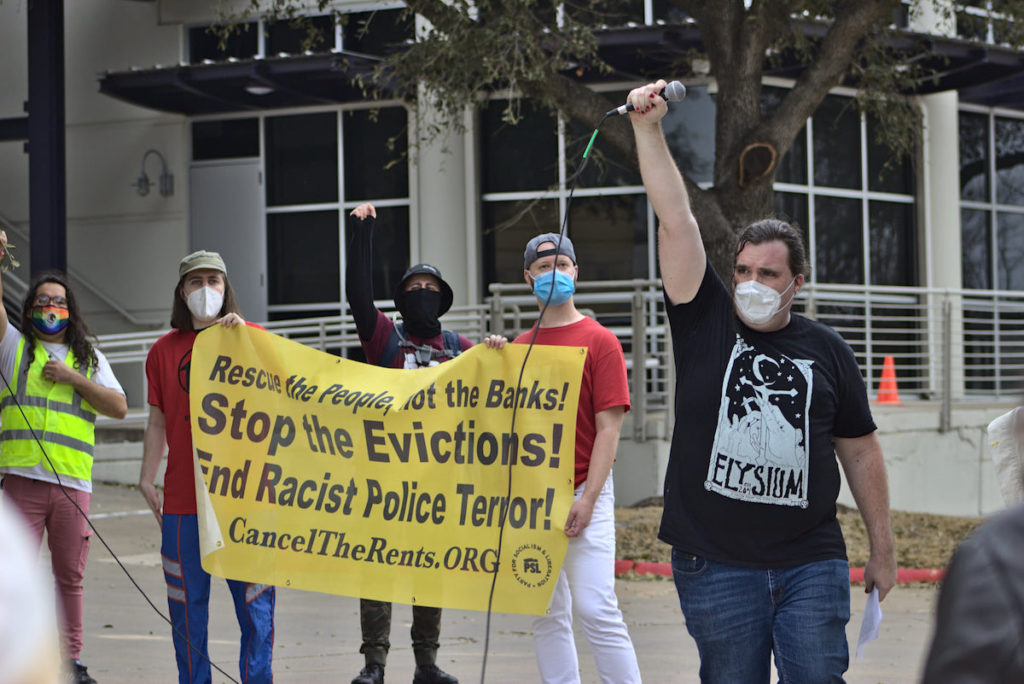On Feb. 28, people from across the state of Texas gathered at Electric Reliability Council of Texas headquarters to protest the criminal negligence of ERCOT and the Public Utilities Commission of Texas in handling the freezing weather conditions of the past few weeks.
ERCOT operates the Texas electrical grid, serving 25 million residents and controlling 90 percent of the state’s electrical grid. PUCT is the state regulatory agency for water, power and telecommunications.
The action brought together a wide range of speakers, including climate activists, educators, union representatives and tenants. Residents from the cities of Austin, Dallas, Houston, and San Antonio were present.
The message of the varied speakers was unified: The criminal negligence of state leaders, which has had devastating impacts on people across the state, began long before the onset of cold weather. The residual effects of power outages will continue to harm communities long into the future, as well.
Tenants and organizers speak to common fears: job loss, evictions, poor housing conditions
A speaker from Dallas Stops Evictions noted that families in his city are still being housed in hotel rooms awaiting safe housing. Tenant representatives shared horror stories of thousand-dollar electric bills, repair costs passed onto tenants, and frozen pipes left burst, broken, and leaking for days on end.
A representative from the San Antonio Tenant’s Union spoke of elderly and disabled residents left stranded without food or clean water. Many tenants also brought up the fear of losing wages and their jobs after they missed work due to the freezing temperatures.
Mutual aid groups help amid the crisis
Many of the organizers that spoke outside ERCOT were from mutual aid groups, community organizations and unions. These same groups, some formed in just the last year in response to the COVID-19 pandemic, quickly moved to fill the gap left by the lack of leadership during the severe winter weather over the past few weeks.
When these vulnerable residents were left without power, heat, or water, it was often the community, not city or state leaders, who showed up with relief. Yet, these same community members and organizations reported receiving harassment and threats of criminal trespassing from landlords, simply for helping residents who found themselves abandoned by the people who were supposed to represent them.

Community asks, who is to blame?
The stories told at the Feb. 28 protest all spoke of the everyday dilemma faced by workers in Texas and across the country. With so many facing housing discrimination, environmental racism, unemployment and waves of evictions due to the mishandling of the pandemic, the fragility of Texas’s privatized power grid in the face of a winter storm brought an already tenuous situation to a breaking point for many.
Many officials from ERCOT, PUCT, and both the Texas state and federal government are to blame for this crisis. But even more importantly, organizers and community members made sure to identify the systemic nature of this disaster. The harm suffered by the people of Texas was not a freak occurrence, but the predictable outcome of a system set up to guarantee profits, especially those of the fossil fuel industry, over human life.
Despite the promises of “competitive prices” and other advantages, it was deregulation that precipitated the disaster. Energy companies across the state had no financial incentive to weatherproof their equipment or maintain any substantial reserves of energy. The “free market” has no mechanism to provide such incentives. Although state leaders were quick to scapegoat renewable energy, it was actually Texas’ natural gas reserves that came up short. Gas wells froze and plants went dormant with no electricity remaining to pump fuel for these power plants. The snowballing of these effects left the power grid “seconds and minutes” away from total statewide blackout and complete collapse in the words of an ERCOT executive.
Natural gas and fossil fuel executives, as well as officials in ERCOT and PUCT, should face criminal charges for their role in the deaths, injuries, and damages suffered during this crisis. State and federal politicians should also be held to account. Efforts from members of both ruling class parties over many years were needed to make Texas’s experiment with runaway deregulation possible in the first place.
We need more than mutual aid — we need socialism
Even as the weather warms, the loss of housing, health, and income will continue to harm working people for months or years to come. The reality is, we need more than just volunteer-run mutual aid organizations to patch together efforts during crises like the Texas winter storm and the COVID-19 pandemic. These efforts by the very communities affected by crises are certainly heroic, but they can never solve the underlying issues that their work cleans up after.
The only solution is a new system, a socialist system — a government run by and for working and oppressed people, with public utilities like energy and water run with the best interests of people, not profit, as the top priority.






